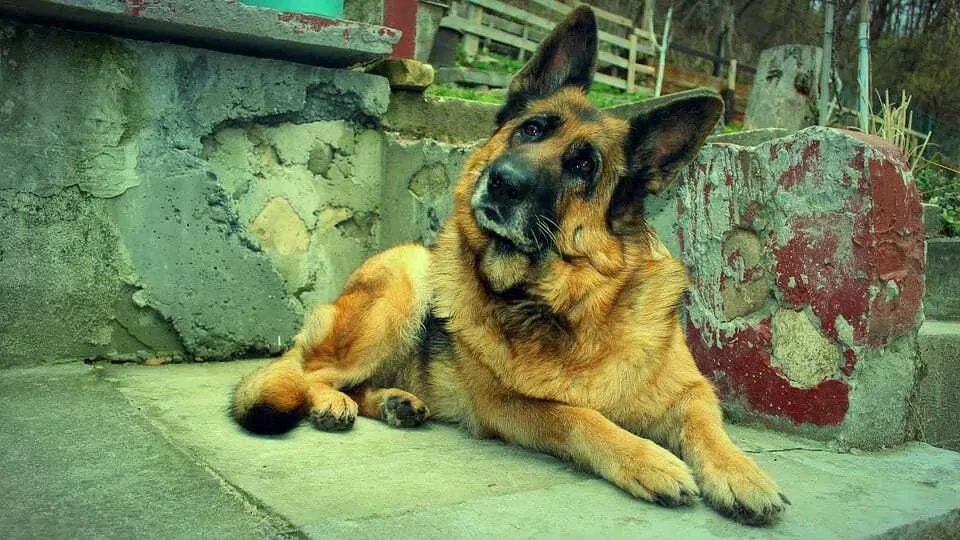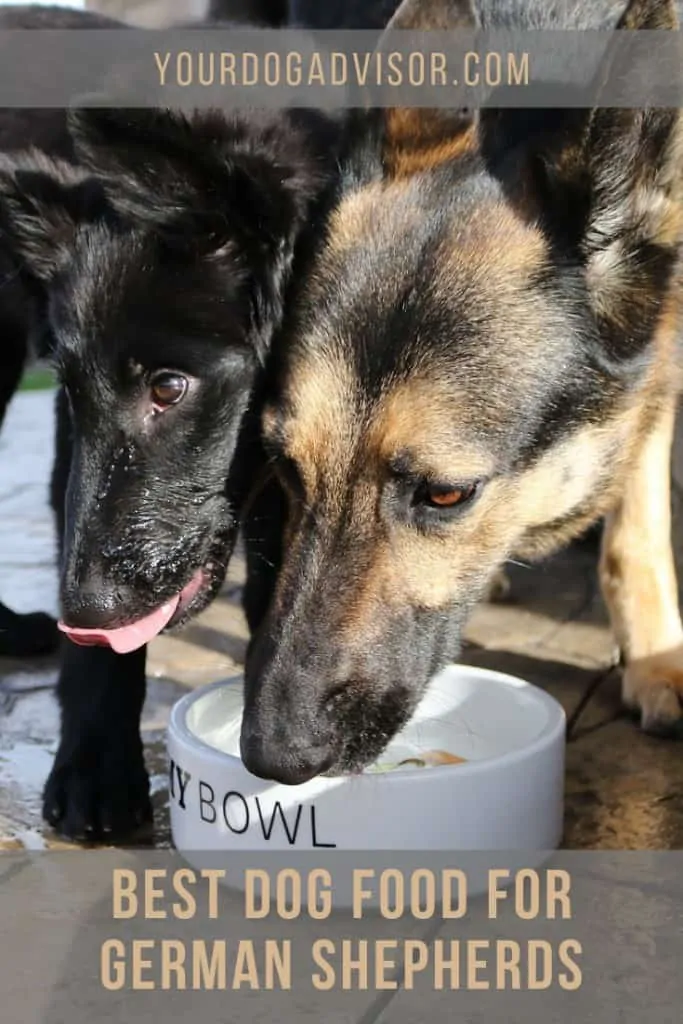Okay, so we should preface this article by saying that there is not a one size fits all best dog food – period! Every dog is different with what they will like and do well on. Of course, there are certain requirements that some dogs will have. Puppies need a food that contains the right balance to support their growth, senior dogs may need one that supports their changing metabolism, some dogs may have allergies, intolerances or medical conditions that mean that they need to avoid particular ingredients.
For certain breeds, there are things that may be useful in terms of their size or to minimize problems with any potential genetic predispositions. So, while we would argue that there is no one, best dog food for German Shepherds, this article is going to cover certain things that may be of extra benefit based on their specific breed traits. This will help you to evaluate whether the ingredients of the food you are considering could be particularly beneficial or detrimental.
Like every other dog, there is no one size fits all ‘best’ food for German Shepherds but there are things that it is good to be aware of when selecting a diet for your dog
Contents
Care Should Be Taken to Avoid Overly Rapid Growth in German Shepherd Puppies
Puppy foods generally have higher protein and density levels to support the extra nutritional needs of a growing puppy.
For large breed dogs like German Shepherds, there can be a problem with puppy foods that are too high density or with the puppies being overfed as it can encourage overly rapid growth during crucial development periods that can have long-lasting detrimental effects in terms of musculoskeletal problems.
Respected Vet and German Shepherd expert Dr Karen Hedberg has produced a very useful document providing more detailed guidance on appropriate Weight Gain for German Shepherd puppies that we would suggest taking a look at.
Making sure that the food is not too high density and that you are carefully following feeding guides and not being tempted to feed more is extremely important.
Care should be taken not to over feed your German Shepherd puppy during their rapid growth phase as this can cause musculoskeletal problems
A Food To Help Minimise The Risk of Musculoskeletal and Joint Problems
German Shepherds are more prone to conditions like hip and elbow dysplasia and these can also lead onto the development of osteoarthritis.
While some of this could relate to a genetic predisposition, you can also help minimise the risk but ensuring that you follow the guidelines above and do not overfeed your growing puppy.
The use of joint supplements is still an area that holds much debate. There are some studies that have suggested that Glucosamine can have a possible beneficial impact on the symptoms of mild osteoarthritis but this has only been shown in a couple of clinical trials and the extent to which they will help is not dramatic. Many foods already contain glucosamine, especially the larger breed foods, and it would do no harm to search for one that included this ingredient. Adding additional joint supplements containing glucosamine may also be worth considering.
Our article on the benefits of supplements provides further information and details of other products that are also sometimes used to help with mobility.
German Shepherds are more at risk of joint problems like osteoarthritis. Selecting a diet with joint supplements included may be beneficial
Be Aware of the Risk of Bloat
German Shepherds are a breed that are more prone to the potentially life-threatening condition of Bloat. This condition is a complex one and there are still a lot of unknowns around it.
What is known is that this condition occurs when air builds up in the dog’s stomach, making it dilated, and the stomach also dramatically twists and this impacts on the pancreas which can cause a toxic build up in the system. These two separate things cause serious problems in terms of blood flow and pressure on the heart and there is a high mortality rate.
It is a fast acting condition and if treatment is not received swiftly after symptoms appear the prognosis is not good and dogs will usually go into shock because of the trauma on their body.
Dogs will have an enlarged, distended stomach and they may appear restless and uncomfortable. They may whine or flinch when their stomach is touched or manipulated. They may also begin to retch or salivate and it is important that veterinary attention is sought immediately if these symptoms appear.
While it is not entirely clear exactly why or how bloat is triggered, it is known that large breed, deep and narrow chested dogs are at greater risk. Great Danes, for example, are one of the breeds at highest risk because of their size and conformity.
There are some dietary factors that seem to correlate with an increased chance of bloat occurring. Feeding your German Shepherd smaller and more frequent meals is important. If they only have one large meal a day this can increase the risk.
It is also believed that if the dog eats more slowly this can also reduce the risk. Feeding from a slow feed bowl or from a treat toy like a Kong, for greedy and gulping dogs, could also be useful. Sometimes feeding a larger, crunchier kibble sizie can encourage your dog to chew more too.
Don’t Be Tempted to Over Feed
Alongside the risk of excessive growth in the key puppy development phases, if a dog is overfed or on too dense a food, then there is a greater risk of them becoming overweight. Feeding a lower fat food can be helpful and it is also important to ensure that you carefully portion control. Because of the joint problems that German Shepherds can be more prone to, if they are overweight this can put excess strain on their joints which could exacerbate or accelerate the problem. If your dog is overweight, sometimes a diet food is appropriate to consider to help facilitate the weight loss.
Making sure that you keep your German Shepherd a healthy weight is important to minimise the strain on their joints, amongst other benefits
Be Aware of Their Propensity Towards Tummy Troubles
German Shepherds are a breed that is linked with a number of gastrointestinal, stomach issues.
The catch-all term for certain chronic conditions of the stomach and bowels with similar symptoms is Irritable Bowel Disease (IBD). This is something that German Shepherds are more genetically prone to than many other breeds and it can cause loose stools, weight loss, possible vomiting, and a general lowering of their overall health.
If a more conclusive underlying cause is not able to be found, then often looking at the dog’s diet can be a common line of action to trying to control the IBD. Often when a change of diet is used alongside appropriate medications this can have a drastic impact on the dog’s quality of life and general health.
Often a diet with a reduced fat content will be considered, it is also important to pick a food that is highly digestible. Sometimes a diet with higher fibre content can also help to firm up the stools. It is important to make sure you are not overfeeding or using a diet with a lot of artificial ingredients. Don’t be tempted to feed your dog table scraps or other treats that are not consistent with their overall diet and could be high in bad fats.
There are prescription diets that are formulated specifically for dogs prone to IBD but some people choose to just research high-quality diets available more widely. For dogs with very specific dietary requirements, sometimes a home-cooked diet can be useful. We always recommend seeking advice from a certified nutritionist when considering a home-cooked diet to ensure that your dog gets the correct balance of nutrients.
Diet Can Be Important in Managing Exocrine Pancreatic Insufficiency
German Shepherds are also more at risk of Exocrine Pancreatic Insufficiency (EPI). This condition relates to when the pancreas does not produce enough digestive enzymes and this impacts on how effectively they can digest their food. If this is left untreated dogs can become seriously ill, quickly lose their body condition and have chronic diarrhoea.
The condition is generally easier to treat than normal chronic pancreatitis with a controlled low-fat diet and the use of enzyme supplements that are added to their daily diet.
It is always important to consult your vet to ensure you get an accurate diagnosis and appropriate advice about treating the condition going forward.
A Diet That Promotes Good Coat Condition Is Important
German Shepherds are notorious shedders. Regardless of their health and condition, you will never be able to completely eradicate their shedding and a good hoover, a good de-shedding tool like a Furminator, and a regular grooming regime are important.
If your dog’s coat is in good condition though this can also help to control the shedding. A dull, lifeless can result in even more hair loss. By picking a food with healthy and appropriate fatty oils this can help to maintain a good coat condition. Fish Oils contain high quantities of omega-3 fatty acids and, as well as helping to keep your dog’s coat in good condition, they are believed to have anti-inflammatory properties which may help with joint health too.
Zesty Paws Salmon Oil is a well recommended product for allowing you to add additional fish oils to your dogs diet.
No products found.

Jen Jones is a professional dog trainer and behavior specialist with more than 25 years of experience. As the founder of ‘Your Dog Advisor’ and the ‘Canine Connection’ rehabilitation center, she applies a holistic, empathetic approach, aiming to address root causes rather than merely treating symptoms.
Well known for her intuitive and compassionate approach, Jen adopts scientifically-proven, reward-based methods, encouraging positive reinforcement over punishment. Jen specializes in obedience training, behavior modification, and puppy socialization. Her innovative methods, particularly in addressing anxiety and aggression issues, have been widely recognized. Jen has worked with many of the world’s leading dog behaviorists and in her free time volunteers with local animal shelters and rescue groups.




